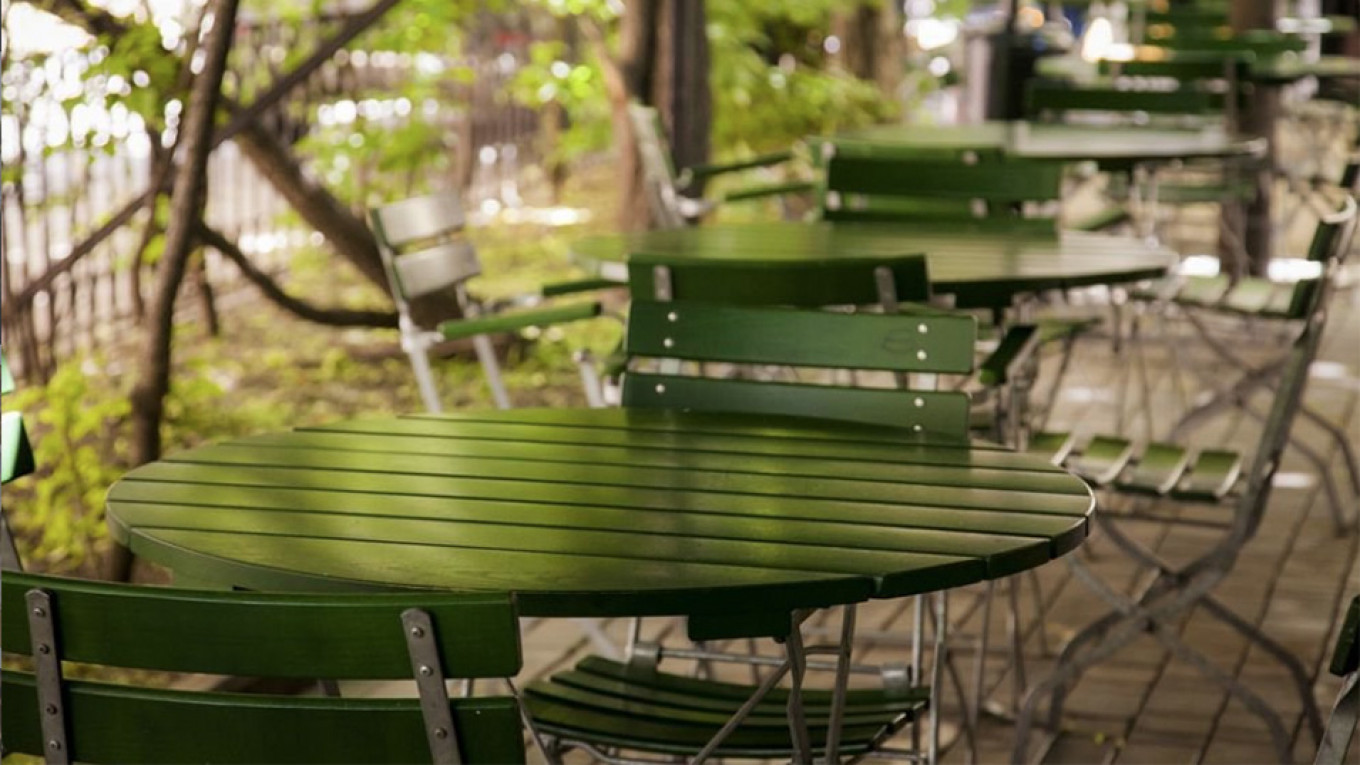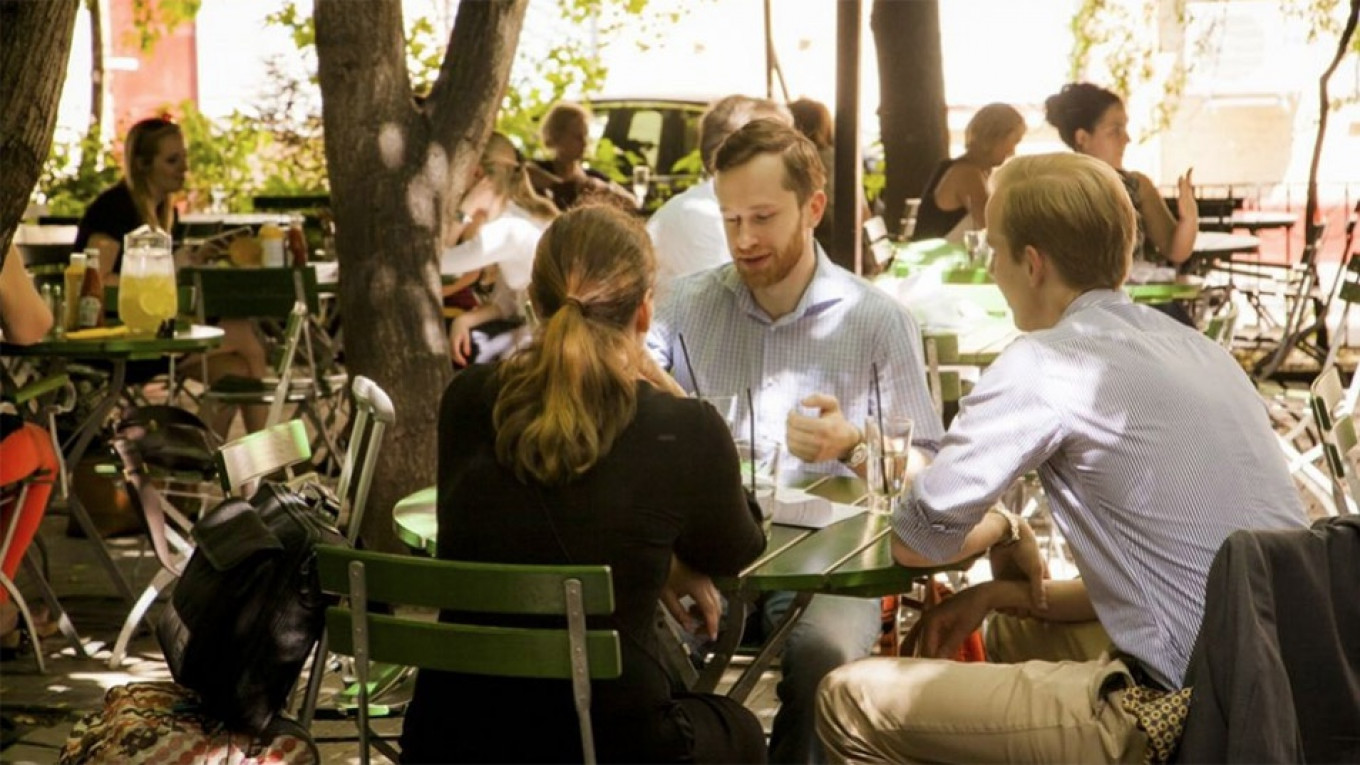I wasn’t going to go. It was chilly and it would be depressing. There would be a big crowd of people there to say goodbye and to reminisce about better times.
But then I went. It was the last night that the restaurant Scandinavia — “Scandi” — was going to be open, and I just had to go and say goodbye. For more than 20 years, it was a vital fixture in Moscow’s foreign community. Owned and operated by Swedish management, the food and service and atmosphere were dependably excellent, though remarkably (for Moscow) unpretentious. It felt very…..European.
And in summers, there was the Scandi terrace. If you didn’t know it, you won’t know it now. But for all of us who did, its opening each year meant that summer had arrived. Snuggled in a courtyard just off of Tverskaya, there was nothing particularly special about it, except it was so comfortable and inviting. You were certain to run into people you knew any time you went. And long, long before Moscow became gripped in the hamburger craze, Scandi easily had the best burger in town. I mean it really was something spectacular, and almost worth its absurd cost.
The awnings, chairs and tables were dark green and had a Nordic simplicity and comfort. Each summer, the legendary manager Sandra would fly down from Sweden to run things. She was wonderful — warm, hardworking, and friendly. Her staff was wonderful — warm, hardworking, and friendly — and a tribute to her skill as a manager. We all felt at home on the Scandi terrace. And in a way, we were.
And sometimes we were too at home. A friend of mine somehow procured — as a wedding or birthday present, I think — a giant official “KGB” pump thermos, with the initials, insignia, shield and all emblazoned on it. Each year, we would meet for our annual “Thermos Night” at Scandi. My friend would plop the thing in the center of the terrace table and we would order several bottles of chardonnay to fill it.

People generally behaved at Scandi because it was the kind of place where you’d run into clients — or bosses. But on Thermos Nights were we gave that a bit of the finger. We’d call people over to join us. We’d get their empty glasses and pump the giant KGB thermos. We’d ask the not particularly bemused waitstaff to refill the thermos. (Cue Sandra smiling tiredly, eyeing the staff and giving the anguished signal just to do what the two idiots wanted.) The others at the table were generally indulgent, if a little perplexed (though the thermos-owner’s husband nearly always refused to take part). But the two of us pretty much spent these nights affecting grand poses of pomp and elegance as we pumped, and then fell over ourselves laughing. It was one of several annual events not to be missed (at least so we thought), and it’s about as rowdy as Scandi got with us — but that thermos could pour out a lot of chardonnay.
Things change. Sandra eventually stopped coming down. Moscow’s restaurant scene grew real wings. Foreigners began leaving in droves. And tell me where you won’t find a hamburger in Moscow now. In recent years, Scandi became kind of depressing and empty. The owner of the coveted thermos moved away.
On Friday, there weren’t many people on the Scandi patio. It was disappointing, anticlimactic, but why would it be any different? While I was waiting at the outdoor bar for a friend, I watched as a member of the staff said goodbye to his colleagues for good. Damn, it was sad.
A group of us gathered in the center of the terrace with people coming and going, just like the old days. A friend sent a message to Sandra telling her we missed her and were remembering her. (She sent a warm note back from Sweden, where she has a small hotel and restaurant.)
Farewell, Scandi, a place that was so much an oasis from Moscow, and at the same time, so Moscow.
A Message from The Moscow Times:
Dear readers,
We are facing unprecedented challenges. Russia's Prosecutor General's Office has designated The Moscow Times as an "undesirable" organization, criminalizing our work and putting our staff at risk of prosecution. This follows our earlier unjust labeling as a "foreign agent."
These actions are direct attempts to silence independent journalism in Russia. The authorities claim our work "discredits the decisions of the Russian leadership." We see things differently: we strive to provide accurate, unbiased reporting on Russia.
We, the journalists of The Moscow Times, refuse to be silenced. But to continue our work, we need your help.
Your support, no matter how small, makes a world of difference. If you can, please support us monthly starting from just $2. It's quick to set up, and every contribution makes a significant impact.
By supporting The Moscow Times, you're defending open, independent journalism in the face of repression. Thank you for standing with us.
Remind me later.







